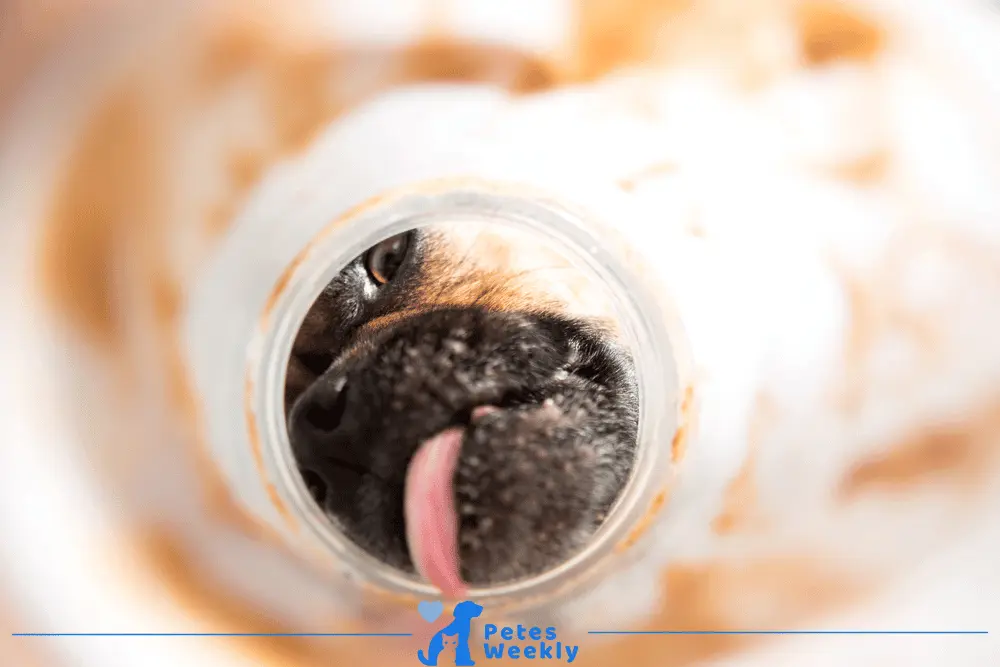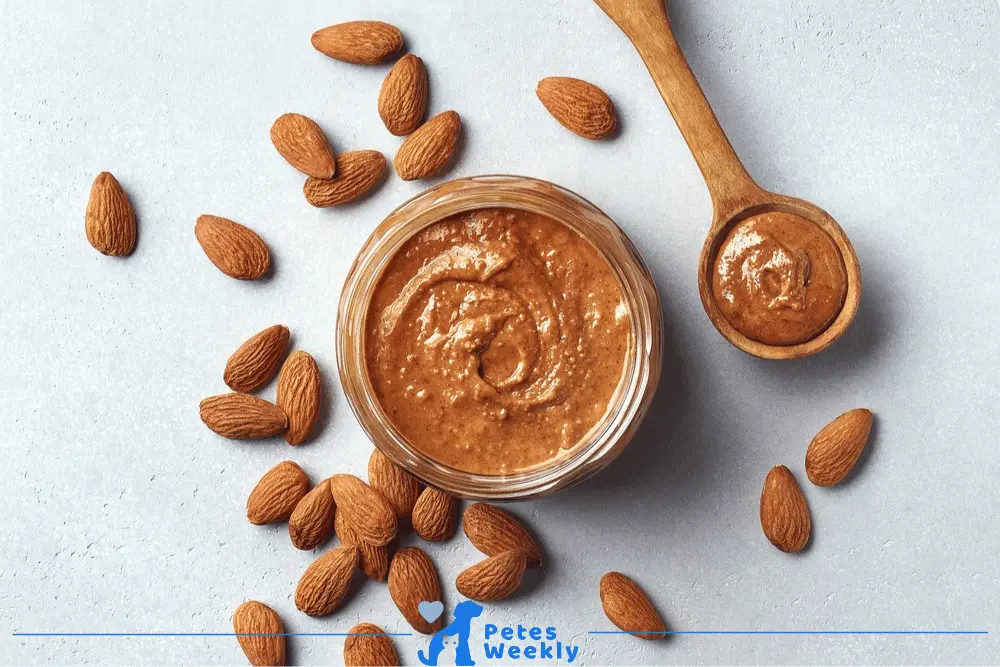Our pets often manage to snatch a nibble from our food, raising the question: Can Dogs Eat Almond Butter? Many of us love almond butter as a treat, but its safety for dogs is discussed among pet owners. Let’s explore the relationship between almond butter and our four-legged buddies.
What is in Almond Butter?
Almond butter is made from roasted almonds and brims with nutrients, including vitamins and protein. While it’s a delicious treat for us, we need to tread cautiously when offering it to our pets. With any food, it’s wise to read the label. What’s okay for us might not be for our pets. Some ingredients can upset them, so checking twice is a smart move.
Ingredients and Nutritional Benefits
Almonds are a fantastic snack. Loaded with vitamins like E, B2, and B3, they’re a nutritional hit. They also pack in protein, which is great for both us and our dogs. If you’re after a wholesome treat or pondering a nibble for your four-legged buddy, remember almonds. They’re not just tasty; they’re a health-packed choice, too.
Sugars, Salt, and Fat Content
Natural almond butter is often low in sugar and salt. But watch out! Some brands might toss in extras like brown sugar, salt, or fake sweeteners to make it taste better. When picking almond butter, choose one without all the added stuff. It’s better for you and tastes just as good.
Can Dogs Eat Almond Butter?
Yes, dogs can have a little almond butter once in a while. But remember, just like we watch our treats, we need to be careful with theirs. When thinking of sharing almond butter with your dog, first check if it’s okay and give just a little. Remember, even if they love it, a lot of it might not be good for them.
Amount and Moderation
When we think about almond butter, a tablespoon appears quite modest to us. However, it’s a different story when it comes to our canine companions. For them, even a mere 1 to 1 1/2 teaspoons is more than sufficient. This portion is not only safe but also quite delightful for their taste buds.
Even so, before you indulge your furry friend, there’s a vital step you must pay attention to consulting your veterinarian. They’re the experts who can provide tailored advice on incorporating almond butter into your dog’s diet without any concerns. So, when pondering almond butter treats, remember to reach out to your vet for that extra layer of assurance and care. Your pet’s health and happiness are worth it.
Taste of Almond Butter for Dogs
Almond butter for dogs offers a delightful taste adventure for our furry friends. Packed with nutty goodness, it’s a canine favourite. This nutty treat provides a creamy, rich flavour that pups find utterly irresistible. They savour every lick, their tails wagging with joy.
But it’s not just about the taste; almond butter is a healthy choice, too. It’s a great source of protein, healthy fats, and essential nutrients, contributing to a glossy coat and strong bones. Plus, it’s gentle on sensitive tummies.
So, whether spread on a dog biscuit or given as a special reward, almond butter makes tails wag and taste buds tingle. Just remember, moderation is key to keeping those paws and taste buds happy.
Almond Butter Benefits
Almond butter can be a tasty treat for your furry friend. Dogs adore the creamy texture and nutty flavour, making it a great way to hide medication. But it’s not just about taste; almond butter offers paw-some health benefits, too. Packed with healthy fats and protein, it supports your pup’s skin and coat. Plus, it’s a bone-strengthening source of calcium. However, moderation is key. Too much almond butter can lead to tummy troubles. Always consult your vet before introducing new snacks into your pup’s diet. Remember, a dollop of almond butter is a delightful reward, but not a full meal for your doggo!
Health Benefits for Humans and Dogs
Almond butter offers fantastic health perks for both people and our furry companions. It’s a powerhouse of nutrients, boasting loads of protein, fiber, and healthy fats. For humans, this creamy delight aids heart health, controls blood sugar, and supports weight management. Plus, it’s a tasty source of vitamin E, an antioxidant champ.
Essential Vitamins and Protein
Almond butter packs a powerful punch of essential vitamins and protein. Loaded with vitamin E, it’s a skin-loving antioxidant superstar. Plus, it’s a protein powerhouse, helping muscles grow big and strong. But that’s not all – it’s like a secret health agent, sneaking in magnesium for bone health and healthy fats for a happy heart. Just a spoonful a day, and you’re on your way to feeling better. So, go ahead, spread it on toast or dip your apple slices – your body will thank you! Almond butter is the tiny jar of goodness that’s undetectably boosting your health.

What Are the Dangers of Almond Butter?
While almond butter can be nutritious, certain ingredients can be detrimental to dogs.
Xylitol and Other Harmful Ingredients
Almond butter can be a yummy snack, but watch out for hidden dangers like Xylitol. Xylitol, often used as a sweetener, is hazardous for our furry friends, like dogs. It can lead to severe health issues, even death. So, keep it out of reach. Moreover, some almond butter sneak in unhealthy stuff, like added sugars and hydrogenated oils. These can wreck your health. Always check labels for these culprits. Stay safe and enjoy almond butter responsibly. Keep Xylitol away from pets, and choose almond butter with simple, wholesome ingredients for a healthier treat. Your well-being and your pet’s safety matter most!
Weight Gain and Pancreatitis in Dogs
Almond butter can cause weight gain and pancreatitis in dogs. Weight gain happens when our furry friends indulge in calorie-rich treats like almond butter. This can lead to obesity, a common concern for dog health. High-fat foods like almond butter can also cause pancreatitis, a painful inflammation of the pancreas. Dogs lack the necessary enzymes to digest almonds properly, making them a risky snack. Symptoms include vomiting, diarrhoea, and abdominal pain. To ensure your pet’s well-being, consult your veterinarian for safe treatment options. Remember, a healthy dog is a happy dog, so choose their snacks wisely!
Other Nut Butter Dogs Can Eat
If almond butter isn’t an option, other nut butter can be a tasty alternative for your dog.
Peanut Butter vs. Almond Butter
Dogs love nutty treats, but is peanut butter or almond butter the top choice? Peanut butter, a classic favourite, boasts affordability and wide availability. Almond butter, though pricier, offers more vitamins and minerals. Opt for unsalted, unsweetened versions, and share sparingly. Remember, moderation is key for a happy, healthy pup!
Cashew Butter and Other Alternatives
Cashew butter, an excellent snack, isn’t just for humans. Packed with nutrients, it’s a pup-pleaser. Yet, ponder alternatives, too. Pumpkin puree is doggy-delightful, aiding digestion. Sweet potato offers vitamins galore. Always ensure safety—no raisins or grapes! Goat cheese, a protein powerhouse, might tickle their taste buds. Blueberries and carrots? Woof-worthy, low-cal options. Bananas add a hint of sweetness. Keep servings small, savouring each bite. Remember, consult your vet for Fido’s dietary delights. It’s a barkin’ good world of options to pamper your furry friend!

Conclusion
Dogs should avoid almond butter. While almonds themselves aren’t toxic, almond butter often contains additives like Xylitol and excess salt, which are dangerous for dogs. Consuming such additives may lead to seizures or kidney failure. It’s wise to consult your vet before sharing any human food with your furry friend. Keep their well-being a priority, sticking to dog-friendly treats and snacks. Remember, safety comes first!
FAQs
Is natural almond butter better for dogs than commercial ones?
Yes, natural almond butter without additional ingredients is safer.
How often can I give almond butter to my dog?
It’s best as an occasional treat in small quantities.
Are there any signs to look out for if my dog has consumed too much almond butter?
Gastrointestinal distress, weight gain, or signs of pancreatitis are some symptoms.
Can puppies consume almond butter?
Always consult a veterinarian before introducing any new food to a puppy’s diet.
What other human foods are safe for dogs?
Foods like carrots, blueberries, and rice are safe, but it’s essential to research and consult a vet.
